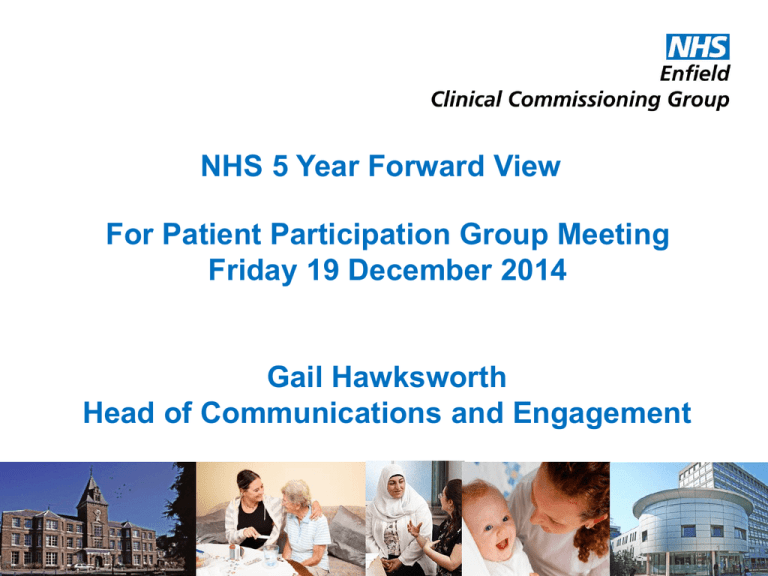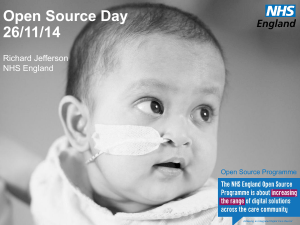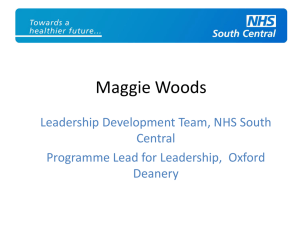NHS Five Year Forward View - NHS Enfield Clinical Commissioning
advertisement

NHS 5 Year Forward View For Patient Participation Group Meeting Friday 19 December 2014 Gail Hawksworth Head of Communications and Engagement 1 NHS Five Year Forward View • The NHS Five Year Forward View was published on 23 October 2014 and sets out a vision for the future of the NHS. • It has been developed by the partner organisations that deliver and oversee health and care services including NHS England, Public Health England, Monitor, Health Education England, the Care Quality Commission and the NHS Trust Development Authority. • It sets out how health services need to change and promotes more engagement with patients, carers and citizens. 2 Summary • • • • • • • Although the NHS has improved over the last 15 years, but quality of care can be variable, preventable illness is widespread and health inequalities deep rooted Patients’ needs are changing and new treatment options are becoming available. Service pressures are building. This ‘Forward View’ sets out the direction for the NHS- showing why change is needed and what it will look like A radical upgrade in Prevention and Public Health is needed with national action on obesity, smoking alcohol and other major health risks Patients need to gain greater control of their own care- option of having shared budgets for health and social care NHS to take steps to breakdown the barriers in how care is provided between family doctors and hospitals, between physical and mental health, between health and social care NHS National leadership will support local communities in choosing from a number of new care delivery options. It will also need to act coherently so will be looking at its payment rules, regulatory requirements and other mechanisms that are applied 3 New Care Delivery Options • Multispecialty Community Provider- Groups of GPs to combine with nurses, other community health services, hospital specialists and possibly mental health and social care to create integrated out-of-hospital care • Primary and Acute Care Systems- integrated hospital primary care provider- general practice and hospital services working together • Redesigning of Urgent and emergency care- These services will be redesigned to enable A&E departments, GP out-of-hours services, urgent care centres, NHS 111 and ambulance services 4 New Care Delivery Options • Smaller Hospitals- A number of actions will be taken that include reviewing the NHS payment regime, new models of medical staffing, new organisational models e.g. Sharing of management for either the whole organisation or back office roles with similar hospitals; some of its services being provided by another specialised provider; local acute hospital and local primary and community services forming an integrated provider • Specialised Care- NHS England will work with local partners to create specialists providers to develop network of services over an area; integrating different organisations and services 5 New Care Delivery Options • Modern Maternity Services- Review models for maternity units to report on how best to sustain and develop maternity units across the NHS, make sure the tariff based funding supports the choices women make and make it easier for groups of midwives to set up their own NHS- funded midwifery services • Enhanced health in Care Homes- NHS England will work with the local NHS and the care home sector to develop shared models of in-reach support, including medical reviews, medication reviews and rehabilitation services 6 Empowering patients • Information- Access to information will be improved. Within 5 years all citizens will be able to access their medical and care records (including in the social care contexts) and share them with carers or others they choose • Provide support to people to manage their own healthThere will be investment in evidence-based approaches e.g. group-based education for people with specific conditions and self-management educational courses • Increase patients direct control over the care provided to them- Ensure that patients have choice over where and how they receive care • Integrated Personal Commissioning (IPC)- A voluntary approach to blending health and social care funding for individuals with complex needs 7 Engaging communities • • • • Supporting Carers- New ways will be found to support carers, by working with voluntary organisations and GP practices to identify them and provide better support Encouraging community volunteering- Develop new roles for volunteers which could include family and carer liaison workers, educating people in the management of long-term conditions and helping with vaccination programmes Stronger partnerships with charitable and voluntary sector organisations- The NHS will try to reduce the time and complexity associated with securing local NHS funding by developing a short national alternative to the standard NHS Contract where grant funding may be more appropriate and encourage funders to commit to multiyear funding wherever possible The NHS as a local employer- The NHS is committed to ensuring that boards and the leadership of NHS organisations better reflect the diversity of local communities they serve. As an employer to ensure all staff have support and opportunities to progress and create supported job opportunities to ‘experts by experience’ e.g. people with learning disabilities who can help drive changes in culture and services 8 How will we get there • Clinical Commissioning Groups - NHS England will work with CCGs to offer them more influence over the local NHS budget for their local populations, ranging from primary to specialised care • Joint commissioning between the NHS and local government- NHS England will work with local areas to consider a limited number of models of joint commissioning between the NHS and local government. This will include Integrated Personal Commissioning (the blending of health and social care funding for individuals with complex needs), e.g. Better Care Fund –style for specific service, possible joint management of social and health care commissioning which could be under the leadership of Health and Wellbeing Boards 9 How will we get there • Provide aligned national NHS Leadership- NHS England, Monitor, the NHS Trust Development Authority, the Care Quality Commission, Health Education England, National Institute for Health and Care Excellence (NICE) and Public Health England, collaborating with the patient and voluntary sector organisations, will create a combined work programme to support the development of local care models – Monitoring- Greater alignment of local assessment, reporting and intervention regimes for Foundation Trusts, NHS Trusts and CCGs by Monitor, TDA and NHS England – National regulatory, pricing and funding regimes- These will support change in specific local areas where it improves services – National Quality Board- This Board consisting of the key NHS oversight organisations will come together regionally and nationally to share intelligence, agree action and monitor overall assurance on quality 10 How will we get there • • • Support a modern workforce- Supported by Health Education England, NHS England will address immediate gaps in key areas and put in place new measures to support employers to retain and develop their existing staff, increase productivity and reduce the waste of skills and money Information Revolution- NHS England will focus on systems that provide the ‘electronic glue’ which enables different parts of the health services to work together National Information Board- This has been established to bring together organisations across the NHS, Public Health, Clinical Science, Social Care, Local Government and Public health representatives who will provide a set of ‘road maps’ setting out who will do what to transform digital care. – Key elements to include: Comprehensive transparency of performance data More NHS accredited health-apps for patients to use Fully interoperable electronic health records GP appointments and electronic and repeat prescribing available on line everywhere Bringing together hospital, GP, administrative and audit data to support quality improvement, research and identification of patients who most need health and social care support Technology- including smartphones- to build capacity for all citizens to access information and train staff to help support those who are unable or unwilling to use new technologies 11 How will we get there • Health Innovation- NHS England will continue to support the work of the National institute for health Research (NIHR) and the network of specialist clinical research facilities in the NHS. Steps will be taken to speed up innovation in new treatments: – Radically cut the costs of conducting Randomised Control Trials (RCTs) – Support the rollout of the Clinical Practice Research Datalink – Will look at how to expand the use of ‘commissioning for evaluation’ i.e. looking at real world clinical evidence in the absence of full trial data – Will work with NICE to expand the work on devices and equipment and to support the roll out of high value innovations – Cancer Drugs Fund- This has been expanded access to new cancer medicines. New approach to converging its assessment and prioritisation processes with a revised approach from NICE – Quicker adoption of cost effective innovation in both medicines and medtech 12 How will we get there • Efficiency and productive investment- Independent analysis shows that there will be a mismatch between resources and patient needs of nearly £30 billion a year by 2020/21 • Maintenance of a Comprehensive high-quality NHS- action will be needed on 3 fronts to mitigate for this: – Demand- A bigger preventative and public health agenda; greater support for patients, carers and community organisations; new models of primary and out-of-hospital care – Efficiency- NHS has to accelerate some its current efficiency programmes to achieving 2% each year- this would require investment in new care models and the combination of less efficient providers matching the performance of the best with the development of new and better ways of working and moderating demand • Funding- NHS funding has been protected in over the past 5 years and this has helped to sustain services. Depending on the combined efficiency and funding option taken, the £30 billion can be closed by one third, one half or all the way. 13 How will we get there • 3 Funding Options1. NHS budget remains flat in real terms from 2015/16- 202/21 and the NHS delivers productivity gain of 0.8%. This combined effect will reduce the gap by a third from £30 billion to £21 billion. 2. NHS budget remains flat in real terms but NHS delivers stronger efficiencies of 1.5%. The combined effect is the £30 billion gap in 2020/21 is halved to £16 billion. 3. NHS gets needed infrastructure and operating investment to move to new care models and ways of working, which results in demand and efficiency gains of 2%-3% net each year. This combined with staged funding increases closes the £30 billion gap by 2020/21. 14 Questions? 15







